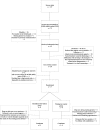Cognitive behavioural therapy and mindfulness for relatives of missing persons: a pilot study
- PMID: 31363418
- PMCID: PMC6642737
- DOI: 10.1186/s40814-019-0472-z
Cognitive behavioural therapy and mindfulness for relatives of missing persons: a pilot study
Abstract
Objectives: Relatives of long-term missing persons need to deal with uncertainties related to the disappearance. These uncertainties may give rise to ruminative thinking about the causes and consequences of the loss. Focusing on tolerating uncertainties in treatment of relatives of missing persons might foster recovery. Adding mindfulness to cognitive behavioural therapy might serve this aim. The feasibility and potential effectiveness of cognitive behavioural therapy with mindfulness were evaluated in a pilot study. We aimed to detect changes in symptom levels and mindfulness from pre-treatment to 1 week, 12 weeks, and 24 weeks post-treatment.
Method: Dutch adults who experienced the disappearance of a significant other more than 3 months earlier and scored above clinical thresholds for psychological distress were eligible to participate. Participants were recruited from January 2015 to July 2016. Participants in the immediate treatment group started treatment after 1 week after randomization, whereas waiting list controls started the treatment after 12 weeks of waiting. Data from self-report measures as well as clinical diagnostic interviews (tapping persistent complex bereavement disorder, major depressive disorder, and posttraumatic stress disorder) were gathered among 17 relatives of missing persons with elevated symptom levels.
Results: The response rate (31.7%) was low, and dropout rate (47.1%) high. Cognitive behavioural therapy with mindfulness coincided with changes in psychopathology levels (Hedges' g 0.35-1.09) and mindfulness (Hedges' g - 0.10-0.41). Participants completing the treatment were satisfied with treatment quality and reported high treatment compliance.
Conclusions: Because of the limited research about effective treatments for relatives of missing persons and promising results of small and/or uncontrolled trials examining the effect of mindfulness-based treatment to target grief-related complaints, it seems valuable to continue investigating the effects of cognitive behavioural therapy with mindfulness on reducing post-loss psychopathology in future research. However, in order to increase the feasibility of future trials among relatives of missing persons, we recommend collaborating internationally and/or extending duration of recruitment phase, to maximize the sample size.
Trial registration: The Netherlands National Trial Register, NTR4732.
Keywords: Ambiguous loss; Bereavement; Disappearance; Grief; Mindfulness; Missing persons; Therapy; Treatment.
Conflict of interest statement
Competing interestsThe authors declare that they have no competing interests.
Figures
Similar articles
-
Cognitive behavioural therapy for psychopathology in relatives of missing persons: study protocol for a pilot randomised controlled trial.Pilot Feasibility Stud. 2016 Apr 1;2:19. doi: 10.1186/s40814-016-0055-1. eCollection 2016. Pilot Feasibility Stud. 2016. PMID: 27965839 Free PMC article.
-
Grief rumination mediates the association between self-compassion and psychopathology in relatives of missing persons.Eur J Psychotraumatol. 2017 Oct 16;8(sup6):1378052. doi: 10.1080/20008198.2017.1378052. eCollection 2017. Eur J Psychotraumatol. 2017. PMID: 29163871 Free PMC article.
-
A randomized controlled pilot study of a brief web-based mindfulness training.BMC Psychiatry. 2011 Nov 8;11:175. doi: 10.1186/1471-244X-11-175. BMC Psychiatry. 2011. PMID: 22067058 Free PMC article. Clinical Trial.
-
Mindfulness and bodily distress.Dan Med J. 2012 Nov;59(11):B4547. Dan Med J. 2012. PMID: 23171754 Review.
-
Psychological interventions to improve self-management of type 1 and type 2 diabetes: a systematic review.Health Technol Assess. 2020 Jun;24(28):1-232. doi: 10.3310/hta24280. Health Technol Assess. 2020. PMID: 32568666 Free PMC article.
Cited by
-
My Grief App for Prolonged Grief in Bereaved Parents: A Pilot Study.Front Psychiatry. 2022 Apr 25;13:872314. doi: 10.3389/fpsyt.2022.872314. eCollection 2022. Front Psychiatry. 2022. PMID: 35546953 Free PMC article.
-
Mobile app for prolonged grief among bereaved parents: study protocol for a randomised controlled trial.BMJ Open. 2021 Dec 7;11(12):e052763. doi: 10.1136/bmjopen-2021-052763. BMJ Open. 2021. PMID: 34876429 Free PMC article.
-
Online cognitive-behavioural therapy for traumatically bereaved people: study protocol for a randomised waitlist-controlled trial.BMJ Open. 2020 Sep 3;10(9):e035050. doi: 10.1136/bmjopen-2019-035050. BMJ Open. 2020. PMID: 32883723 Free PMC article.
-
The self-help app My Grief: Bereaved parents' experiences of helpfulness, satisfaction and usability.Internet Interv. 2024 Jan 17;35:100712. doi: 10.1016/j.invent.2024.100712. eCollection 2024 Mar. Internet Interv. 2024. PMID: 38298472 Free PMC article.
-
Prevalence, comorbidities, and factors associated with prolonged grief disorder, posttraumatic stress disorder and complex posttraumatic stress disorder in refugees: a systematic review.Confl Health. 2024 Apr 16;18(1):32. doi: 10.1186/s13031-024-00586-5. Confl Health. 2024. PMID: 38627778 Free PMC article. Review.
References
-
- American Psychiatric Association. Diagnostic and statistical manual of mental disorders (5th ed.). ed. Arlington, VA: Washington, D.C.: American Psychiatric Association; 2013.
-
- Prigerson HG, Bierhals AJ, Kasl SV, Reynolds CF. Complicated grief as a disorder distinct from bereavement-related depression and anxiety: a replication study. Am J Psychiatry. 1996;153(11):1484–1486. - PubMed
-
- Boelen PA, van de Schoot R, van den Hout MA, de Keijser J, van den Bout J. Prolonged grief disorder, depression, and posttraumatic stress disorder are distinguishable syndromes. J Affect Disord. 2010;125(1-3):374–378. - PubMed
-
- O'Connor M, Lasgaard M, Shevlin M, Guldin MB. A confirmatory factor analysis of combined models of the Harvard Trauma Questionnaire and the Inventory of Complicated Grief-Revised: are we measuring complicated grief or posttraumatic stress? J Anxiety Disord. 2010;24(7):672–679. - PubMed
-
- Lundorff M, Holmgren H, Zachariae R, Farver-Vestergaard I, O’Connor M. Prevalence of prolonged grief disorder in adult bereavement: a systematic review and meta-analysis. J Affect Disord. 2017;212(786–794):138–149. - PubMed
LinkOut - more resources
Full Text Sources




